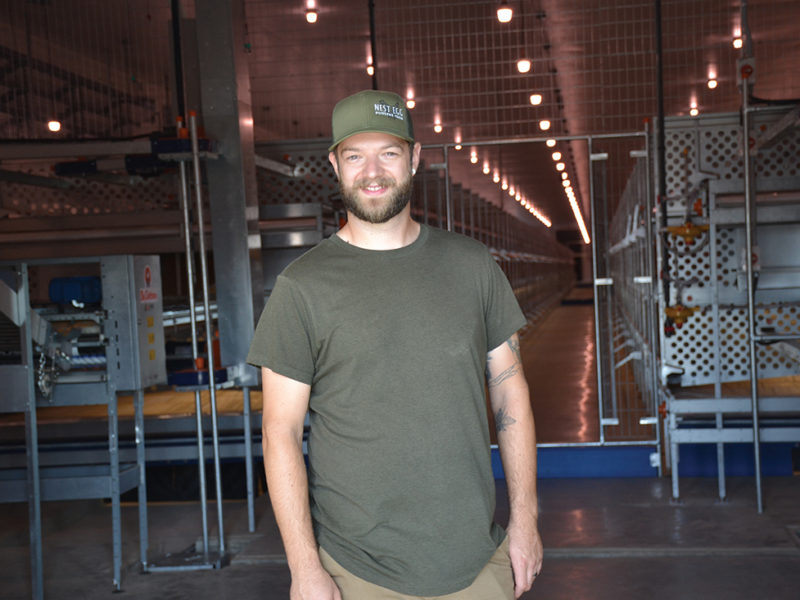ABBOTSFORD – Many young farmers face necessary upgrades to facilities when they take on the family business. Sometimes, maintaining the status quo isn’t always an option.
Andrew and Stephanie Penner went big when they took over their layer operation from Andrew’s parents two years ago. The barns were already at capacity and they knew the timing was right to build for the future, not just for now.
Nest Egg Poultry is now the largest aviary facility of its kind in the world according to Tyler de Boer with AgPro West Supply. The multi-million dollar operation is outfitted with a Big Dutchman Natura Step XL Aviary system, which de Boer describes as the big brother of other aviary systems.
“The main [difference] is its width,” he says. “It allows for more birds while complying [with] any regulations.”
As a third-generation egg farmer, 34-year-old Andrew Penner watched his family farm grow to slightly more than 20,000 birds, all of them in conventional cage housing.
“We knew we had to move out of cage systems. It was the time to decide,” he says. “I decided I wanted to be in specialty, so went with the aviary, free run.”
Building new also allowed him to build for expansion. The new facility, developed over the course of a year, effectively doubles the farm’s capacity to 40,000 birds. It’s laid out as two barn units under a single roof. Each barn has a capacity of 20,000 birds. Penner plans to sit at 11,000 per barn (22,000 total) for a while by adding quota credits to his current quota level that allows for slightly more than 20,000 birds. He may consider expanding to as many as 35,000 in the future.
While currently built for free-run production, with a few minor modifications, the new barns will accommodate free range or organic. Free range would require installation of a fence and windows would need to be installed in pre-framed spaces to qualify for organic certification. (A change to feed is also required.)
The barns are designed for maximum bird comfort. Computer controls and sensors monitor and allow the Penners to control temperature, carbon dioxide and ammonia in addition to the custom ventilation system.
“Andrew is being progressive in wanting the best quality of life for the birds,” says de Boer.
In conventional barns, manure piles up but the aviary system’s conveyors ensure manure is removed.
“Barns used to live for a cycle and now we’re moving the manure regularly,” says de Boer. “It’s better for the birds.”
Specialty production
Penner isn’t the only one seeing the benefits of specialty egg production. BC Egg reports that more than 44% of BC eggs are a specialty product, with 14.5% produced in enriched environments, 8.6% free run, 9.2% free range and 11.9% organic.
Scott Janzen, who ships to Island Gold, also has layers in the Fraser Valley.
“We have farmed with an aviary system – both free range and free run. The Penners came to see ours and to decide which way to go. I call it a jungle gym for chickens,” he says of the aviary system. “You have to farm it a bit differently. You have to see them, smell what they’re smelling, hear what they’re saying.”
He feels that more Grade A eggs come out of a system like the Penners, helping meet rising demand for cage-free production. The Penners’ ship their eggs to Island Gold, which distributes them across Vancouver Island and the Lower Mainland.
The Penners’ first batch of birds, Novogen pullets, came to the barns at 15 to 18 weeks old and have been specifically reared to an aviary system environment by Abbotsford-based Pacific Pride Chicks.
Attached to the barn is the automated Damtech egg packer which de Boer says has the smallest footprint of anything on the market. It moves eggs from the barns’ conveyors into flats. Flats stack up at the end of the packing line where they’re transferred to a cooler to await pickup.
Having strong family relationships is “huge” to making such a large undertaking work, says Penner. He says the family talks a lot about the operation. While it’s his now, he also values the wisdom and experience his parents bring.


 Hog producers face changes to code of practice
Hog producers face changes to code of practice